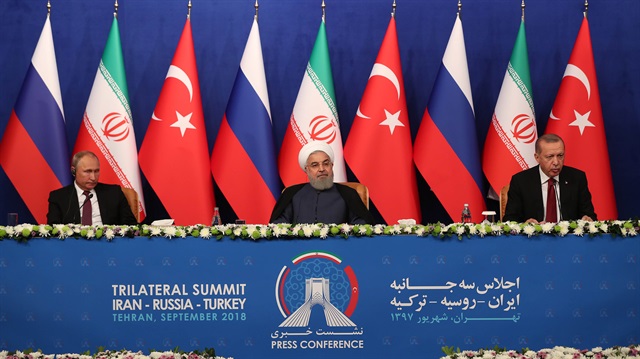
Media outlets in UK, Germany, Austria, Greece give coverage to Tehran summit
Turkey’s call for an immediate cease-fire during Friday’s trilateral summit with Russia and Iran and the humanitarian crisis have been widely covered by European media outlets.
British channel Sky News said in its news about the Tehran summit: “Russian President Vladimir Putin and Iran's President Hassan Rouhani pushed back against Turkey's Recep Erdogan's call for a truce.”
Underlining that Turkey -- a country that has given refuge to 3.5 million Syrians since the start of the civil war -- would face a new flow of refugees if Syria’s Idlib is targeted by armed forces, British channels said north-western Idlib province and surrounding areas are home to about three million people, nearly half of them civilians displaced from other parts of Syria.
Speaking at a joint news conference with Putin and Rouhani, Erdogan said it is important to end bombardments in Syria's Idlib and ensure cease-fire.
"If we can declare a cease-fire here, it will be one of the most important steps of the summit, and it will relieve the civilians," Erdogan said.
Under the headline “Russia rejects Turkey's calls for Idlib truce”, BBC said: “Russian President Vladimir Putin has rejected Turkey's calls for a truce to prevent a 'bloodbath' in north Syria.”
“The three-way meeting in Tehran had been seen by many as a final chance to prevent a large-scale battle in Idlib,” it said.
The Times reported that Russia and Iran rejected a truce despite Turkey’s warning of a bloodbath in the region.
The Guardian said: “Russia’s Vladimir Putin and Iran’s Hassan Rouhani openly clashed with Turkish president” over the proposed truce during the closing press conference.
“It is unclear whether Russia will now order Syrian government forces to pause in the face of Erdogan’s resistance, and growing warnings from the west of a humanitarian disaster if a full-scale military escalation goes ahead,” the paper said.
- Greece
Greek media also widely covered the summit and underlined the rejection of Turkey’s cease-fire call by Russia and Iran.
Greek daily To Vima said Putin rejected Erdogan’s call for a cease-fire because the Al Nusra group in Idlib was not present at the summit.
Kathimerini pointed out that the summit failed to produce any concrete steps. It said hopes to stop a new bloody clash in Syria were fading.
- Austria
Austrian state television ORF said “Idlib’s future is still uncertain” as the joint conference by Erdogan, Putin and Rouhani failed to make a firm statement on stopping any attacks on Idlib.
Austria’s Kurier daily shared with its readers Erdogan’s message: “If the world turns a blind eye to the killing of tens of thousands of innocent people to further the regime’s interests, we will neither watch from the sidelines nor participate in such a game.”
The daily reported Erdogan as saying “the Idlib question must be resolved in line with the spirit of Astana and without giving rise to pain, new tensions or more suffering”.
- Germany
German daily Deutschlandfunk covered the summit with a headline, which also pointed to the lack of a concrete result.
It underlined that Erdogan urged for a cease-fire in the summit and said the region would turn into a bloodbath if the Syrian regime attacked Idlib; however, Russian and Iranian leaders rejected this call as they supported the Syrian regime.
Die Zeit newspaper said Putin and Rouhani are in favor of an assault in Idlib to beat terrorism in the region.
Der Spiegel magazine quoted Putin as saying Russian Air Force were bombing separatists in Idlib and rejected Erdogan’s cease-fire request.
It also said Putin pointed out in the summit that Syrian President Bashar Al-Assad needed to get full control of his country.
- The Netherlands
“Russia and Iran still oppose Turkey in Idlib” was the headline of the Dutch Broadcast Foundation, NOS.
It reported Erdogan’s calls for a truce and warnings of a bloodbath in the region.








